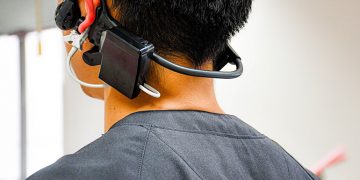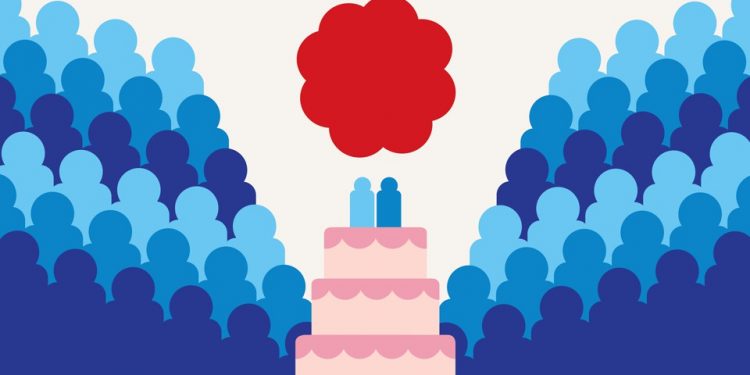
Editor’s Note: Every Wednesday, James Hamblin takes questions from readers about health-related curiosities, concerns, and obsessions. Have one? Email him at paging.dr.hamblin@theatlantic.com.
Dear Dr. Hamblin,
My brother and his fiancée are planning to get married next week in California. I just assumed they would postpone it or have a small gathering, but as it turns out they’re going through with the 150-person wedding and local authorities are allowing it. I still don’t even feel comfortable going to a grocery store, so I can’t even imagine going to a large wedding and reception—even though everyone has been told they’ll have to wear masks. Oh, and they want my 3-year-old son to be in it. I feel like I could’ve said no, but that would’ve made me feel really bad and I didn’t want my relationship with his soon-to-be-wife to be affected going forward. Their decision is fully theirs to make, but it puts me and all other guests in a very awkward and potentially unsafe position. What do I do? Or say?
Anonymous
San Jose, California
This is an unfortunate situation to be put in. You’re being forced to choose between feeling irresponsible and afraid, and feeling unkind and paranoid. At least one clear, universal lesson can be learned here: Don’t put people in this sort of position. Actually, two: Just because local officials haven’t forbidden something doesn’t make it safe. Legal can’t be mistaken for wise.
In your specific case, I’m kind of in awe that this big wedding is happening right now. Cases of COVID-19 in California are surging. Having a reception seems especially feckless, because that part is specifically about interacting with other people. It’s easy to say that attendees will wear masks and socially distance, but that goes one of two ways: People adhere to the rules and the experience is awkward and sad, or they don’t and risk spreading the virus. When you bring together a lot of friends and family, the natural instinct to embrace and act like you did in the old days will be difficult to overcome. Not everyone in attendance will be on the same page about their willingness to socially distance. It’s not a setting where people could truly party.
Having a wedding ceremony is a little different. For some, the whole ritual is hollow and trivial to begin with, so the pandemic is a perfect excuse to just elope. But for a huge number of people the marriage just won’t feel real without a ceremony of the sort that they’ve been imagining as long as they can remember: “the best day of my life.” The wedding-industrial complex paints a picture of a festive, elaborate, catered gathering as essential to any hope for marital bliss.
[Read: The pandemic’s long-lasting effects on weddings]
But that’s their problem, not yours. If you aren’t comfortable going to the wedding ceremony, you shouldn’t go. I wouldn’t feel comfortable. Having 150 people signals a lack of caution. Weddings can be selfish affairs, but having this event right now goes beyond selfish. Anyone who is inviting people to celebrate them in a mass (or even minor) gathering during this pandemic carries the burden of making extremely, deeply, abundantly clear to people that they don’t need to come.
A new type of wedding invitation might help lay out the vibe: no more “We’d be thrilled for you to join us” or even “We request your presence” unless it is extremely clear that zero credit will be lost by guests who join virtually. Actually, I’m not even sure virtually should be a word anymore. Zooming into a wedding needs to be considered as real as being there in corporeal form. This probably should’ve been the case for a long time—I would’ve gone to way more weddings if I didn’t have to fly and book a hotel.
Even a slight suggestion that people should be physically present will guilt people into traveling. Getting people to avoid mass gatherings is difficult enough; the least we can do is enable people who don’t even want to. The couple shouldn’t even want people there who feel uncomfortable. And at the same time, they shouldn’t want people there who are going to break the rules and make the marginally comfortable people suddenly feel like they made the wrong choice. The invitation should probably include some footnote about how such people will be asked to leave.
[Read: A very unwelcome wedding guest]
The weddings themselves also need a rethinking. Ceremonies can be as large as anyone wants, though only a small number of people (possibly even zero) should be physically present. If people do gather, don’t have everyone sing. If you have a preacher or the like, have them use a microphone rather than vocally projecting. The same goes for speeches or toasts at the … reception, which isn’t a word we should probably use, either. This is a moment to totally reimagine the traditional reception. The warm summer months will make it easier to find some way to bring together a group of people outside—you could have a buffet and a picnic where people could, hypothetically, enjoy themselves while still distancing. Once things move into a bar or restaurant, though, I think all bets are off.
It’s probably too late to convince your brother of this, but he and his fiancée would do better to save the reception for later. I know a lot of people stand to lose some money by canceling events right now. If that’s the case with your brother, remember that Americans are not infrequently charged hundreds of thousands of dollars for getting a severe case of COVID-19. And that’s just from a financial toll. Once you start factoring in the cost of human life, the whole thing feels doomed.
At some point, weddings will again be enthusiastic and loud and joyous and uninhibited. Couples who just do a little ceremony now might keep a big reception in their back pocket as something to look forward to once the pandemic is over. That reception might not be for a couple of years, but it will be worth the wait. Plus, it’ll be like you get two weddings. Two best days of your life. And then you can act overtly, righteously indignant if people don’t come.
Related Podcast
Listen to James Hamblin answer listener and reader questions on Social Distance, The Atlantic’s podcast about life in the pandemic:
Subscribe to Social Distance on Apple Podcasts or Spotify (How to Listen)
“Paging Dr. Hamblin” is for informational purposes only, does not constitute medical advice, and is not a substitute for professional medical advice, diagnosis, or treatment. Always seek the advice of your physician or other qualified health provider with any questions you may have regarding a medical condition. By submitting a letter, you are agreeing to let The Atlantic use it—in part or in full—and we may edit it for length and/or clarity.














